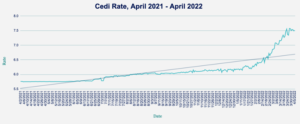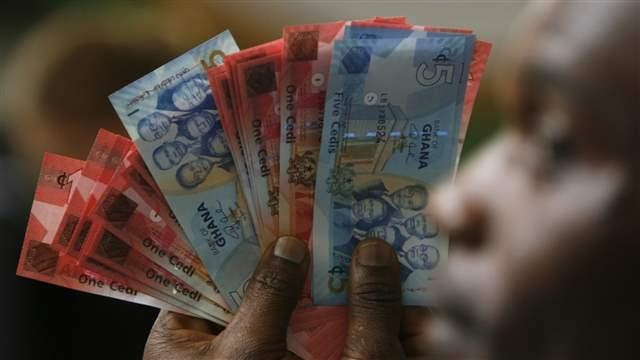Bank of Ghana interventions helping steady Cedi
The Cedi halted its recent slide against the dollar, trading stronger at 7.51 from 7.53 at last week’s close as the Bank of Ghana intervened to ease pressure on the currency.

Ghana President Nana Akufo-Addo signed into law the controversial Electronic Transfer Levy bill, which the government hopes will raise much needed revenue by imposing a 1.5% tax on electronic transactions over GHS100.
Meantime, Ghanaian logistics company Translas Logistics has signed a deal with Nigeria’s newly minted Dangote fertiliser plant to import more affordable fertiliser into Ghana, helping ease the country’s supply shortages.
The Bank of Ghana’s second quarter calendar for the sale of foreign exchange to shore up the currency commits $50m per week, compared with $75m in Q1.
We expect the Cedi to hold steady in the coming days given the central bank’s resolve to continue support for the currency.
Russia-Ukraine driving Africa policy amid food shortages
As Russia’s war in Ukraine continues to impact Africa through supply constraints in the agricultural and energy sectors, governments have been taking diverse economic measures to mitigate against further shocks.
Egypt’s Finance Minister Mohamed Maait said this week that the government has made down payments to the Supply Commodities Authority and the Egyptian Agricultural Bank to fast-track purchases of locally produced wheat.
In Zimbabwe, soaring food and energy costs as a result of the conflict prompted the central bank to hike its benchmark interest rate by 2000bps to 80%, the world’s highest.
International aid groups warn of a looming food crisis as a result of the combined impacts of the war in Ukraine, Covid-19 and local droughts and floods caused by climate change.
Oxfam reported this week that the number of Africans in need of food assistance could rise sharply to 38 million in June from 27 million today.
Naira stabilises at record low as speculators boost dollar flows
The Naira held firm against the dollar on the unofficial market this week, stabilising at current all-time lows of 587, as Bureau de Change’s recorded improved FX flows from speculators looking to take advantage of current rates.

Meanwhile, fuel shortages continue: the Nigerian Senate delayed implementation of the 2021 Appropriation Act until the end of next month as some key infrastructure projects could not be completed due to shortages of diesel.
We expect the Naira to continue to flatline in the short term, with the increased flow of FX from speculators keeping the Naira from weakening beyond 590 levels.
Rand outlook dims on faster Fed tightening prospects
The Rand was broadly flat against the dollar this week, trading at 14.64 compared to 14.65 at last week’s close, supported by higher commodity prices.

However, with the US Federal Reserve signalling it intends to shrink its balance sheet faster, and with Western countries imposing further sanctions on Russia following evidence of a massacre in the Ukrainian town of Bucha, the outlook is gloomier.
With the Fed also likely to raise rates again next month, we expect to see increased pressure on the Rand in the coming days.
Egyptian Pound poised for further strengthening
The Pound appreciated against the dollar this week as it continues to recover from its recent devaluation, currently trading at 18.24 from 18.32 at last week’s close.

Mounting shipping and import costs have prompted Egypt’s Trade Minister Nevine Gamea to ban exports of certain types of scrap metal and paper pulp for six months to help counter domestic shortages.
That adds to a growing list of export bans that already include commodities such as oils, grains and flour. Finance Minister Mohamed Maait said this week that the government has made down payments to the Supply Commodities Authority and the Egyptian Agricultural Bank to fast-track purchases of locally produced wheat.
President Abdel-Fattah El-Sisi introduced a law this week that will boost gold exploration and exploitation in the country’s eastern desert in a bid to ramp up the industry’s contribution to Egypt’s GDP.
Given the government’s continued measures to reduce its exposure to global events, we expect the Pound to appreciate further in the coming days.
Ten-month losing streak drags Kenyan Shilling to new low
The Shilling came under renewed selling pressure against the dollar this week, hitting a fresh record low of 115.20/115.80 from 114.70/115.30 at last week’s close.
FX traders cited a dollar supply shortfall amid increased demand from oil marketers and food and commodity importers. Traditional supply sources such as the agricultural sector and diaspora remittances remain flat.

March marked the Shilling’s 10th-straight month of declines against the dollar, losing 1.7% in the first quarter. Meantime, Kenya’s total debt now stands at 70% of GDP, raising concerns about debt sustainability.
We expect rising inflation from fuel and other commodity price spikes to add further pressure on the Shilling in the near term.
Coffee inflows pep up Ugandan Shilling
The Shilling appreciated against the dollar this week, trading at 3545 from 3605 at last week’s close, supported by strong inflows from Uganda’s commodity exporters, especially coffee.

Remittance inflows were also robust as the holy month of Ramadan began, with FX demand relatively subdued.
We expect the Shilling to make further gains towards the 3500 level in the coming weeks.
Shilling steady as Tanzania seeks $700m IMF loan
The Shilling was little changed against the dollar this week, strengthening slightly to 2320 from 2321 at last week’s close.

The currency held firm despite increased dollar demand from commodity importers amid rising global energy prices. Higher global metal prices are expected to boost Tanzania’s balance of payments position.
The country is also in talks with the IMF about a potential $700m loan as President Samia Suluhu Hassan seeks to overhaul the government’s borrowing strategy and tap more concessional loans to reduce reliance on commercial debt. We expect to see a stable Shilling over the coming week.
Note to journalists: please feel free to quote from this briefing for news reports and let us know any requests for further comment or interviews via the contact details at the end, or by reply to this email. AZA is Africa’s largest non-bank currency broker by trading volume at over $1 billion annually. See https://www.azafinance.com
Issued by AZA. This Newsletter is produced as a service to our clients. It is prepared by our dealing professionals and is based on their understanding and interpretation of market events. AZA cannot be held responsible for any losses of whatever nature sustained as a result of action taken based on comments contained in this publication.
For more information, high-resolution charts or interviews, please contact:
Gavin Serkin
[email protected]
+44 20 3478 9710










